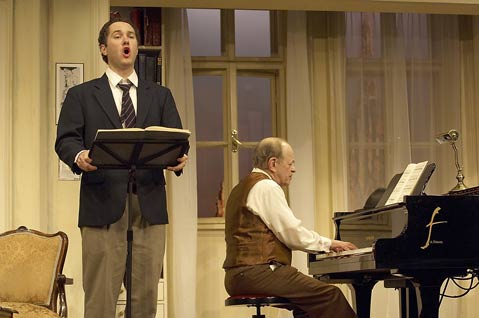ETC’s Old Wicked Songs Comes Home
The Scene of the Anschluss

Theater companies generally do everything in their power to keep their subscribers happy. Priority seating. Ticket-exchange programs. And, of course, discreetly avoiding mention of their past association with Nazi atrocities.
The latter consideration weighed heavily for a time on the English Theatre of Vienna. Artistic director Julia Schafranek had long wanted to stage Jon Marans’ 1996 drama Old Wicked Songs. The story of the relationship between an elderly Austrian vocal coach and a brash young American pianist, it takes place in Vienna and addresses the city’s musical and sociopolitical history-including its warm embrace of the Nazis during World War II.
So here was a play that hit uncomfortably close to home. How close? Well, among the English Theatre’s season ticket holders was Kurt Waldheim, the man elected president of Austria in 1986 in spite of a war record that linked him to mass deportations and massacres. Part of the play takes place during the election campaign, and Waldheim’s name comes up numerous times.
Schafranek hesitated for years before finally deciding to include the play in the 2007-08 season, as a coproduction with the Ensemble Theatre Company of Santa Barbara. It opened in March, just as the city was commemorating the 70th anniversary of the Anschluss-the day Hitler’s army marched into Austria, to cheering crowds, and annexed the country to Germany.
Waldheim died last June (after the production was announced), so it’s impossible to know what his reaction would have been. But his fellow subscribers seemed deeply moved by the play, according to veteran actor Kenneth Tigar. He played the Viennese vocal coach, a role he will reprise when the show moves to the Alhecama Theatre for a four-week run beginning Thursday night.
“I always got the feeling the audiences were a little overwhelmed at how powerful the experience had been,” he said. “During the curtain calls, we very often got bravos and cheers. Most people (who approached me after a performance) talked about the musical aspects; very seldom did anyone bring up the politics.”
“But the two are so intertwined in the play that I began to get the feeling that people talked about the music as a way of expressing their political feelings. My hunch is when they were saying ‘It’s wonderful how the music was used to develop the plot,’ that was code for ‘It’s amazing how you used the music to talk about the Nazi period.'”
Both Tigar and director Jonathan Fox have strong connections to Austria, Germany, and the Nazi era. Fox’s mother was born in Vienna in the mid 1930s; she and her parents, a lawyer and doctor, were living in the city when the Nazis took over in March 1938. As Austrian Jews, their lives suddenly became extremely difficult.
“My grandmother described it to me as quite a tense time,” Fox said. “They’d come home and find their apartment had been ransacked. They managed to catch one of the last boats out, in early 1939.”
Tigar, a nonreligious Jew, encountered the region’s anti-Semitism firsthand at age 15, when he spent a year in Berlin as part of a student exchange program. After being rejected by family after family, the Massachusetts native went to live at the home of Dr. Albrecht Pietze, a physician who smuggled Jews out of Germany during the war. “He was one of the most remarkable people I have ever known,” the actor said.
Tigar returned to the region in 1970, spending a year in Vienna while his girlfriend studied at a local university. Having just earned a PhD in German literature, he had no idea what to do with his life until he was invited to join a local theater troupe. He had been acting as a hobby since junior high school, and joining the troupe convinced him it should be his profession.
He returned to America in 1971, worked in New York for a few years, and then moved to Los Angeles, where he spent three decades appearing in television shows and films (including the Lethal Weapon series). Today the actor (who has also directed plays and operas) lives in Connecticut and performs primarily on the East Coast.
Although Tigar concedes his musical ability is extremely limited-“I tortured a piano teacher for a couple of years in high school”-he finds the play a remarkably good fit, thanks in part to his previous experience in Vienna. He said the city has changed enormously since the early 1970s, when the populace was still in denial about its collective guilt. Today, “They’re finally beginning to tell the truth about what happened,” he said.
At one point in the play, the keyboard virtuoso visits the Dachau Concentration Camp. This plot element is particularly poignant to Fox, who visited Dachau during a visit to Germany in 1980 and found himself thinking about his grandparents.
They never went back to Austria, he said; the memories were too painful. But to honor them, Fox included a framed photo of the couple on the set. “In a way,” he said with a wistful smile, “this was their return to Vienna.”
4•1•1
Old Wicked Songs runs from Thursday, May 29, to Sunday, June 22. Shows Tuesday through Saturday are at 8 p.m. and Sunday shows are at 2 p.m. and 7 p.m. at the Alhecama Theatre at 914 Santa Barbara St. Call 965-5400 or visit ensembletheatre.com for more information.



